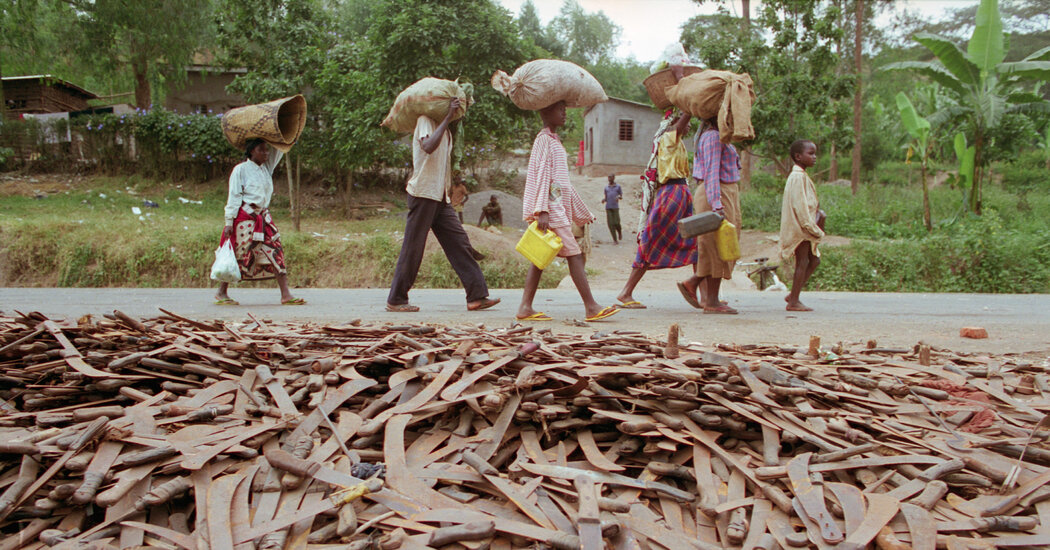The conflict between Rwanda and M23: “I don’t hear the sound of bullets”: At this camp in Rwanda, people find some peace
M23, a group of rebels, has been operating in the region for more than a decade. The conflict is a result of the1994 genocide that started 30 years ago this month.
The United States and the U.N. have condemned Rwanda’s support of M23, a group sanctioned by the U.S. government. Rwanda, though, denies any link — and the country’s President, Paul Kagame, asserts his country’s right to protect itself from regional violence.
What they can’t do, though, is change what’s happening across the border, in eastern Congo. And that change, he said, will require an international response.
“This will require a collective responsibility, especially the international community. I don’t think much will be done if they leave it alone.
And it’s not just livelihoods that have been upended, Rusanjonga says there are emotional scars, too: “Some women here were raped. Some came pregnant after being raped by militia. It’s these kinds of stories that I hear every day.”
Many of the people’s houses in the country were burned down. Even if it ends today, they have nowhere to go back anyway,” he said. They have to start from zero if they go back.
More than one million people in the last two years have been forced to flee their homes in the eastern Democratic Republic of Congo due to worsening violence, and some end up here.
Source: ‘I don’t hear the sound of bullets’: At this camp in Rwanda, people find some peace
The children of a Rwandan genocide refugees’ camp — “I don’t hear the sound of bullets’: A voice in Rwanda’s democratic government
“I’m happy now that I’m here. I had a very good sleep last night, and I was also given food, a blanket and a mat to sleep on,” she said. ” I don’t hear the noise of guns.”
“When they took the cows, I thought, ‘It’s over,’” she said, speaking through a translator. “Because next time, it won’t be the cows. I thought they would come for me and my children.”
David Rusanjonga is the manager at the camp that sits on the Rwanda side of the border with the Democratic Republic of Congo, and said that roughly two-thirds of the population there were children under the age of 17. Many of them came without their parents.
Kids laying on foam mattresses, stacked on the rocky ground. Kids peeking out in curiosity from behind one of the long, semi-permanent shelters where they live. Kids singing, loudly, inside a big structure where they attend school.
Source: ‘I don’t hear the sound of bullets’: At this camp in Rwanda, people find some peace
Rwandan genocide democratic refugees’ war: a story of a refugee’s camp in Rwanda, where some people don’t know where they are
“The children, they separated with their parents back in the DRC, they don’t know where they are,” Rusanjonga said. They don’t know if they’re alive or dead. Sometimes, by chance, parents come later, they get unified.”
Today, that violence has altered life in the region. Aid groups, including the U.N. Refugee Agency, warn of a severe humanitarian crisis. And U.S. officials say the conflict has the potential to spill over into a fully fledged regional war.
Semi-permanent shelters are made out of plastic and corrugated metal and have doors, roofs and walls. Rusanjonga told us that the plastic was designed to last for six months. But some had been there for more than a year.
He said that sometimes they receive people without a blanket to offer. Most of the people here don’t have mattresses. They sleep on mats on the floor in a very rocky environment.
Source: ‘I don’t hear the sound of bullets’: At this camp in Rwanda, people find some peace
A Rwandan prisoner in the Congo: A story of two years in the life of a political prisoner and a girl in a Rwandan jail
She is from Masisi which is in the eastern Democratic Republic of Congolese. She fled to the regional capital, Goma. But she said she was told that she might not be safe there, due to her family’s ethnic ties.
We met the other person in the same structure. It was raining when she wrapped herself in a purple and yellow plaid blanket.
I have not yet spoken at length about what those years in a Rwandan prison were like, or about the daily reality for Rwandan political prisoners who, like me, found themselves behind bars for exercising their freedom of expression. The healing process has allowed me to write again after many years, and I expect it will last for the rest of my life.
